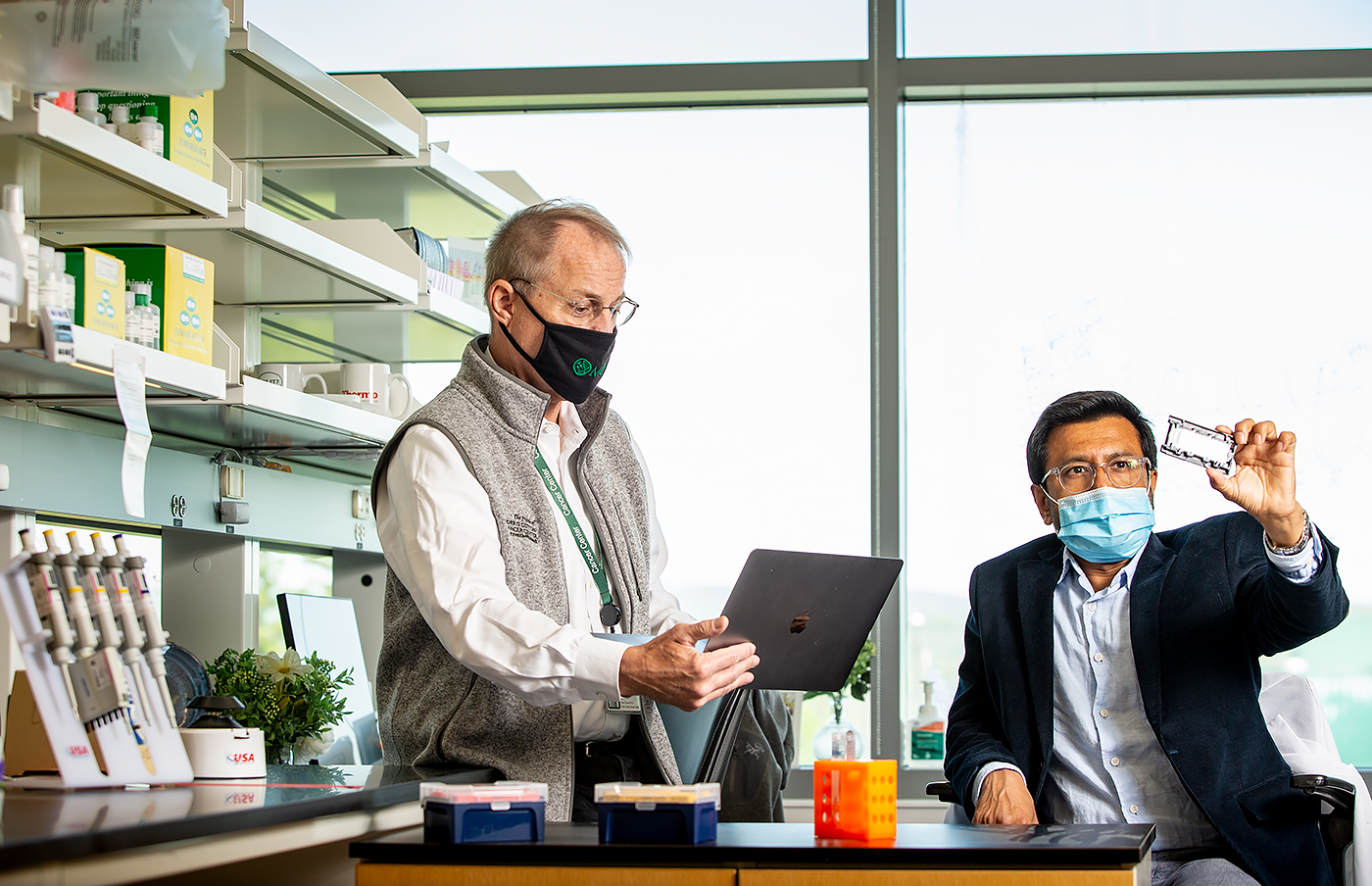
By 2030, the most lethal form of pancreatic cancer, pancreatic ductal adenocarcinoma (PDAC), is projected to become the second leading cause of cancer-related deaths in the United States. Not only are therapeutic options limited, but nearly half of PDAC patients who have their tumors removed surgically experience disease recurrence within a year, even with chemotherapy. For more advanced stages, approximately one-third of patients have a limited response to chemotherapy.
To help PDAC patients, Researchers at Dartmouth’s and Dartmouth-Hitchcock’s Norris Cotton Cancer Center (NCCC), New Hampshire’s only NCI-designated Comprehensive Cancer Center, are developing a prognostic and therapeutic epigenetic biomarker, the first ever epigenetic precision medicine approach to pancreatic cancer. Epigenetic therapy is therapy that can reactivate regulatory genes in chemo-resistant tumors to make the tumors responsive to chemotherapy. The discovery will address the pressing clinical need for treatment of this disease in which physicians are able to utilize a tailored approach, known as precision medicine, as a means toward better outcomes and quality of life for patients.
Led by NCCC Director Steven D. Leach, MD, and Senior Research Scientist in the Leach laboratory, Surajit Dhara, PhD, in collaboration with colleagues at the Memorial Sloan Kettering Cancer Center and Weill Cornell Medicine in New York, the team’s discoveries will help predict those patients who will benefit from traditional chemotherapy and those who may need and benefit from an alternative regimen.
Although there are nine FDA-approved epigenetic drugs, and more in the pharmaceutical pipeline, a means of distinguishing tumors that would benefit from this type of reprogramming therapy is still lacking. “We currently appear to be at the start of a new era in which epigenetic reprogramming will become increasingly relied upon to optimize therapeutic effectiveness in multiple tumor types,” says Leach. “With this work, we have pioneered a precision epigenetic treatment approach in PDAC, an approach that is now ready to be translated into the clinic.”
The team’s work, entitled “Pancreatic cancer prognosis is predicted by an ATAC-array technology for assessing chromatin accessibility,” is newly published in Nature Communications.
“We have a discovery and an invention coming from this work,” says Dhara. “By investigating all epigenetic elements that regulate genes in PDAC, we discovered that only about 1,092 elements are associated with chemotherapy resistance and early recurrence of this disease. Of those, 723 elements are silenced in chemo-resistant tumors and are optimally predictive.”
To translate this knowledge into the clinic, Leach and Dhara invented a technology platform that assesses gene regulatory elements as a means to predict chemotherapy response and the potential benefit of epigenetic therapy in patients with PDAC. The technology is DNA-based and can potentially be performed on fine-needle aspiration specimens collected from tumors at the time of diagnosis.
Leach and Dhara have co-founded Episteme Prognostics, Inc.,--a precision medicine company developing therapeutic biomarkers for pancreatic cancer--in order to translate this work directly to the clinic as rapidly as possible.
About Norris Cotton Cancer Center
Norris Cotton Cancer Center, located on the campus of Dartmouth-Hitchcock Medical Center (DHMC) in Lebanon, NH, combines advanced cancer research at Dartmouth College’s Geisel School of Medicine in Hanover, NH with the highest level of high-quality, innovative, personalized, and compassionate patient-centered cancer care at DHMC, as well as at regional, multi-disciplinary locations and partner hospitals throughout NH and VT,. NCCC is one of only 51 centers nationwide to earn the National Cancer Institute’s prestigious “Comprehensive Cancer Center” designation, the result of an outstanding collaboration between DHMC, New Hampshire’s only academic medical center, and Dartmouth College. Now entering its fifth decade, NCCC remains committed to excellence, outreach and education, and strives to prevent and cure cancer, enhance survivorship and to promote cancer health equity through its pioneering interdisciplinary research. Each year the NCCC schedules 61,000 appointments seeing nearly 4,000 newly diagnosed patients, and currently offers its patients more than 100 active clinical trials.
About Dartmouth-Hitchcock Health
Dartmouth-Hitchcock Health (D-HH), New Hampshire’s only academic health system and the state’s largest private employer, serves a population of 1.9 million across northern New England. D-H provides access to more than 2,000 providers in almost every area of medicine, delivering care at its flagship hospital, Dartmouth-Hitchcock Medical Center (DHMC) in Lebanon, NH. DHMC was named again in 2020 as the #1 hospital in New Hampshire by U.S. News & World Report, and recognized for high performance in 9 clinical specialties and procedures. Dartmouth-Hitchcock also includes the Norris Cotton Cancer Center, one of only 51 NCI-designated Comprehensive Cancer Centers in the nation; the Children's Hospital at Dartmouth-Hitchcock, the state’s only children’s hospital; affiliated member hospitals in Lebanon, Keene, and New London, NH, and Windsor, VT, and Visiting Nurse and Hospice for Vermont and New Hampshire; and 24 Dartmouth-Hitchcock clinics that provide ambulatory services across New Hampshire and Vermont. The D-H system trains nearly 400 residents and fellows annually, and performs world-class research, in partnership with the Geisel School of Medicine at Dartmouth and the White River Junction VA Medical Center in White River Junction, VT.
About the Geisel School of Medicine at Dartmouth
Founded in 1797, the Geisel School of Medicine at Dartmouth strives to improve the lives of the communities it serves through excellence in learning, discovery, and healing. The Geisel School of Medicine is renowned for its leadership in medical education, healthcare policy and delivery science, biomedical research, global health, and in creating innovations that improve lives worldwide. As one of America’s leading medical schools, Dartmouth’s Geisel School of Medicine is committed to training new generations of diverse leaders who will help solve our most vexing challenges in healthcare.